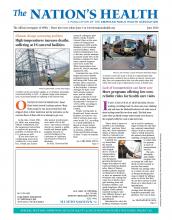
Lewis, left, works with Emily Coyle, a doctoral candidate in the School of Public Health and Community Health Sciences, to make plain language edits to a survey on wildfire smoke.
Photo courtesy Connie Lewis
Connie Lewis works as an administrative assistant at the University of Montana’s Rural Institute for Inclusive Communities. Lewis is actively engaged in the IDD community and serves as a member of APHA’s IDD Advisory Board.
What do you enjoy doing in your personal time?
Gardening. I do cauliflower, broccoli, cabbage, carrots, beans and peas. I like to hand sew or crochet. I like to go out to the stores to see if there’s something I might be interested in buying. I like to read. I’m reading a book that’s called “Surviving Change.”
What are some tasks you perform in your roles?
I work on the photocopier and I answer the phones. I can put packets together and mail them out. I sort our regular mail and put it in people’s mailboxes so they can get their mail for the day. There are times when I clean the microwaves or the tabletops. I’ve helped out with some other projects across campus by signing people in. I also help with writing things in plain language.
I have a second job at Summit Independent Living. They help people with disabilities to become more independent. I’m a part of the peer group that gets to gather by Zoom once a month.
What are common misunderstandings about people with IDD?
I don’t think that people understand me very well. Maybe it’s the way that I say things to them. Or maybe they’re not quite relating to what I am trying to get out.
I know that there are probably some folks out there who thought it wasn’t possible to get a driver’s license. But I was able to get my driver’s license a long time ago. This year I was able to get a new car.
How can spaces be welcoming to people with IDD?
A welcoming place would be a nice, peaceful place. An unwelcoming would be a place with a lot of violence or things like that.
I’ve been to restaurants where the doors should be automatic for people to get in to make it more accessible. Staff members at different jobs should have training to know how to work with somebody with an IDD or a person with a disability. It’s also important to have people with IDD as staff on the job.
I think that having things in plain language doesn’t only help people with IDD or people with disabilities; it might help somebody else out who doesn’t have a disability.
“Having things in plain language doesn’t only help people with IDD or people with disabilities; it might help somebody else out who doesn’t have a disability.”
— Connie Lewis
What advice do you have for health care workers when working with people with IDD?
It is important if they have good questions if they need to ask a person like me or somebody else with IDD. I might not be sure what they need to know. They should try to understand the diversity that they’re working with and understand what they’re asking about.
Why is it important to include people with IDD in discussions about health care?
So people are able to advocate for themselves in health care and speak up for themselves. I think it helps people to become a little more independent instead of being isolated. There are people out there who have been isolated before. It’s nice to be out and trained to be independent.
- Copyright The Nation’s Health, American Public Health Association









